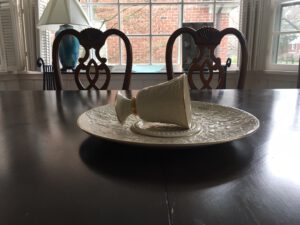I was somewhat ambivalent about “going public” with this essay. I didn’t want to put my Jewish community in a negative light or leave even one of my fellow Jews open to criticism or judgment. Another part of me figured that if Jews were struggling with how Covid-19 is impacting our spiritual life — how we pray, how we do or do not gather, how we’ll cope with living our holiday rites and rituals — others would be too. People of faith are people of faith. Your struggles are mine and vice versa. May we all find way to celebrate the bitter and the sweet in this terrible time of Corona. DBD.
 My rabbi told me he and his colleagues are hearing from congregants who may well forgo Seder completely this year.
My rabbi told me he and his colleagues are hearing from congregants who may well forgo Seder completely this year.
What’s the Seder without the children and grandchildren?
Why go to such bother for just the two of us?
It’s just me? What kind of Seder will that be?
When I heard this, I became as distressed as he was. Not have Seder? I get it. Well, I get the impulse, the inclination to withdraw. But if ever there was a time to have Seder, this is it! In one of the Zooms I did last week, Rabbi Asher Lopatin commented that this year’s Seder will be akin to the first one in Exodus — families huddled in their homes eating their own meals — while mayhem carries on outside. No matter what is going on “outside” we are commanded to retell the story to our children, this very story of huddling in fear, of liberation by God’s outstretched hand, of eating matzoh for seven days (eight now in the diaspora.)
Here’s one of the things I have always loved about being and doing Jewish. When we carry on a tradition, any tradition, we honor and fulfill commandments dictated to us in an ancient scroll. When it says in Exodus 12:24, “You shall observe this as an institution for all time, for you and for your descendants” that means us. We are those very descendants enacting and re-enacting events that hadn’t even yet been digested within historical context.This is a Pesach time unlike any we will have experienced. We need, we must give ourselves over to it despite how weird or strange or uncomfortable it will feel. We have become so used to the Seder paradigm — crowded dining rooms, family and friends from all over, creating new experiences to bring the story to life — that it is hard and painful to imagine doing it any other way. Clandestine Seders were held in concentration camps and in a ghetto bunker the night of the Warsaw Uprising. Who are we to say no to retelling the Passover story at this time of pandemic?
This year we don’t necessarily need props or novel interpretations. Covid-19 is bringing the Passover story to life, giving us an opportunity to join hands with our ancestors who had no idea what would happen come morning, nor any idea what lay at the end of their journey. What if we shared our Seder with them? What if we shared something from the wide arc of Jewish history that they set in motion? What if we spoke to them as they speak to us each year?
If there are no children at the table this year to recount the story of the Exodus to, why not remember ourselves as children and tell that child the story as we might have liked to have heard it? There will be plenty of Zoom Seders to attend. There will also be Seders like my friend Anita’s who is stepping into the experience with loins girded. By choice, she will not Zoom but will celebrate her Seders solo. What a story she will have to share afterwards.
What a story we will all have to share afterwards. Because you can be sure next year a child or grandchild will ask a guest at the table, “What was your Seder last year during the pandemic?” And you shall say to her…What? What will you say?
I just received a wonderful resource by Rabbi Avi Weiss. Please give a look.